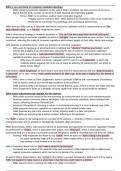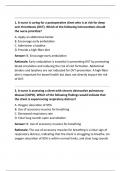- Miller presents consumer capitalism as the root of Willy’s problems, but does not excuse him from
blame that the book consists of elements of both classical and materialist tragedy.
- Hence, Miller is not writing a ‘pathos’ (pure materialist tragedy).
- ‘Tragedy and the Common Man’: Miller believes the Romantic notion of an innate flaw
should not be overthrown by psychology and sociological determinism.
Miller portrays Willy’s job as a salesman and hence consumer capitalism, which is represented by his “two
large sample cases”, as a “burden” weighing him down.
Willy’s nonsensical analogy to Howard’s treatment in “You can’t eat the orange and throw the peel away”
likens people living in consumer-capitalist societies to “oranges” that are discarded as soon as their ‘fruits’ are
consumed, reflecting the reality of consumer capitalism which drains people of their skills, labour and energy.
Willy believes in advertisements, which are products of consumer capitalism.
- Willy uses the language of advertisements in claiming that “vitamins” “build up your bones”, which
sounds like a tagline in an advertisement, reflecting his lack of criticism of consumer capitalism.
- Willy regrets not buying a “well-advertised machine”, suggesting him to have internalised consumer
capitalism and thus have a preference for advertised consumer goods.
- Willy does not realise consumer capitalism and his role in it as “a salesman”, in which the
indefinite article suggests him to be one of many as adhering to expressionism, are partly to
blame for his failure.
Willy idolises “Dave Singleman” as some kind of hero who lived the ideal salesman life and “died the death of
a salesman” as he sees nothing “more satisfying than to be able to go, at the age of eighty-four, into twenty or
thirty cities”.
- Willy’s view is ironic as Dave Singleman’s name is symbolic of failure with connotations of loneliness
and his need to work at such an old age is pathetic to the audience.
- Miller presents Willy to be trying to convince himself that his career choice is heroic and noble and view
Dave Singleman’s death as a template of heroic death from which he would finally be validated.
Willy reacts subconsciously against his life choices.
- Willy seeks to prove himself in the new economy by turning his back on any rural entrepreneurship.
- American writers commonly believe ideologies, such as consumer capitalism, have mediated with
nature, reflecting American Romanticism.
- American Romanticism: returning to nature is considered returning to a more authentic way of life.
- Miller presents consumer capitalism as a perversion of the natural human state.
- Miller believes any job in the science or tertiary industry leads to a false conscience.
- Miller believes everyone has a suited vocation, adhering to Romanticism.
The “flute” is played in the background as a symbol of the pastoral, a reminder of Willy’s vocation of rural
entrepreneurship and an antidote to ideologically-mediated urban interaction.
Miller demonstrates Willy’s subconscious desire for authenticity and opposition to consumer capitalism through
his preference for “Swiss”, which is associated with nature, over “American”, which is associated with
processed food and a symbol of consumer products designed to satisfy a need that does not exist, for cheese.
- Similarly, Willy expresses his desire to buy “seeds” when he does not “have a thing in the ground”.
- As seeds symbolise hope and the pastoral, Miller implies Willy to turn to the pastoral when he
has nothing to look forward to in the future.
Willy is frustrated about how he “can’t raise a carrot in the backyard”.
- As carrots are a symbol of the pastoral, hope and investment, Miller highlights Willy’s helplessness
against consumer capitalism which has led to his denial of his vocation.
As part of Willy’s hallucinations, Ben highlights their father’s success compared to Willy’s lack of it by saying
“With one gadget he made more in a week than a man like you could make in a lifetime”.
- Miller presents Ben’s contempt for Willy to be Willy’s for himself.




